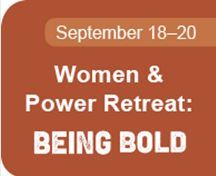After becoming the first African-American to medal in ski racing, Bonnie St. John went on to graduate magna cum laude from Harvard, win the Rhodes Scholarship, earn a graduate degree from Oxford in economics, work in the White House, and become a best-selling author. In this interview she speaks about how to persevere and succeed while taking risks and building resilience.
Omega: You've medaled in the Paralympics, worked in the White House, written books, and helped people around the world fulfill their potential, personally and professionally. Do you see potential as static or dynamic, something we're born with or something we can grow over the course of our lives?
Bonnie: I choose the latter. We don't know fully what our potential is, so we might as well believe we can keep changing it. If you don't know what your full potential is, why not keep pushing the boundaries until you find out? Check out the research on "Growth Mindset." It turns out that this attitude makes us much better leaders.
Omega: You seemed pretty driven as a teenager, leaving your home in San Diego and ski training year-round. What is the difference between determination and perfectionism?
Bonnie: The difference is priorities. You need to have priorities about what is most important to get the results you want. With perfectionism, people try to make everything perfect, all the time. When you change fields or try new things, you will make mistakes. If you're results focused, that's okay. If you're a perfectionist, it's not.
Perfectionism can become paralysis. If you have to get everything right before you move forward, you can't do very many things. You can't explore new areas of your career. You can't innovate. It's debilitating.
As a leader, when you're a perfectionist with your team, you push them to be perfect, and then they're afraid to try anything. They're afraid to do anything without asking. A certain desire for excellence is great. But perfectionism is when you've taken that desire for excellence to excess in too many areas with no sense of priority.
Omega: After seeing an elite ski academy brochure without any pictures of African-American or differently abled students, you said to your brother, "This is impossible. I might as well get started." Yet you must have had deep doubt and fear, as we all do. What do you reach for during those times?
Bonnie: I remember living on a glacier in Oregon. I was isolated from everyone. I had taken time off from college so I wasn't around people my age. I didn't have a car, and the nearest movie theater was a 2-hour drive away. I was lonely, just skiing and working. I was really tempted to give up and go have a normal college life, and have fun. A friend of mine came to visit and said, "You can go back to college and when you finish, you'll get a job, you'll get married, you'll get a house and a mortgage, and you'll have kids. You can do all that. But you never get to do this again. You never get to see how far you can go with skiing. If you quit now, you don't get to do this again." He was right. I never would have found out I could win Olympic medals if I'd quit.
Sometimes a conversation with a friend can turn you around. Surround yourself with positive people who are going to have that conversation with you. I think of it like a radio. You can change the station. You can tune into who you want to listen to. Think of it as ICAN radio. Some people you can't get away from, but you can add more people to the mix. Choose to surround yourself with a lot of positivity. The relative volume changes if those other people are a small part of your conversations.
Omega: Many people understand resilience as an ability to "grin and bear it." Having healed from amputation and sexual abuse, how would you describe it?
Bonnie: Imagine squeezing a sponge and when you let go, it returns to its original shape. A lot of resilience work has focused on getting back to normal. What I and my team at Blue Circle Leadership have focused on for the last four years has been a different kind of resilience: when you get squeezed--how do you get better? Not just back to normal, but better.
We're focused on resilience on very small timescales. How can you be more resilient hour by hour through the day? When a deadline gets moved up or you have a difficult emotional conversation with a client or a coworker, how do you rebound from that and regain your energy, focus, and purpose, and move on? If you can do that hour by hour every day, you can be more resilient on longer timescales. It's focusing on the small-scale decisions and interactions. It takes reflection, focus, and intention.
Omega: You encourage people not to let even the worst of circumstances define them. What do you believe is the importance of making mistakes, taking risks, or asking for help?
Bonnie: I've worked in the White House, on Wall Street, been a Rhodes Scholar, and started my own business. You don't do all that without being willing to fall on your face. When I transitioned from IBM to the White House I immediately made mistakes because I wasn't used to the political environment. When you start a business, the first thing you have is a lot of problems. I have been repeatedly willing to fall on my face, start over, recover, and turn things around. I never assumed things would work. I wasn't even born with the right equipment to learn to walk! Normal was never an option. I never expected to be comfortable.
Bonnie St. John will be a featured presenter at: Women & Power: Being Bold, September 18-20, 2015 at Omega Institute in Rhinebeck, NY.
Explore more in the category of Leadership & Work
© 2015 Omega Institute for Holistic Studies, Inc. All rights reserved.


